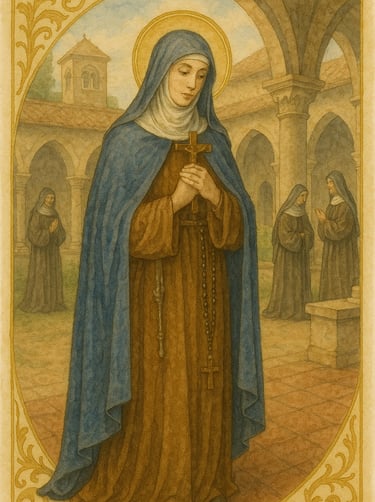St. Elizabeth of Portugal
The Queen Who Chose Peace
Halo & Light Studios
7/4/20253 min read


Click Link for a reel of Daily Dose of Saints and Faithful Art:
https://youtube.com/shorts/1rTNpa_ImWo
St. Elizabeth of Portugal (1271–1336) was not only a queen but a powerful peacemaker, devoted wife, and humble servant of the poor. Born into royalty—the daughter of King Peter III of Aragon and granddaughter of the great King James I—Elizabeth was named after her great-aunt, St. Elizabeth of Hungary, whose legacy of charity she joyfully inherited.
From a young age, Elizabeth was immersed in both prayer and politics. Married to King Denis of Portugal at age 12, she grew into her role as queen with wisdom beyond her years. Though Denis was known for his infidelity, Elizabeth remained faithful, becoming a spiritual anchor for the court. She raised her children with care, even navigating fierce conflicts between her son and husband with prayer, fasting, and bold intervention—earning her the title Peacemaker of the Iberian Peninsula.
What makes her witness remarkable is not merely her royal status, but her Franciscan spirit. After King Denis’s death, she entered the Third Order of St. Francis and lived in simplicity, often disguised as a commoner while visiting hospitals and feeding the poor. Her charity wasn’t performative—it was a genuine outpouring of her interior life rooted in Christ.
St. Paul reminds us in Galatians 5:22–23 that peace is a fruit of the Holy Spirit. But what is peace? The Catechism of the Catholic Church teaches that "The fruits of the Spirit are perfections that the Holy Spirit forms in us as the first fruits of eternal glory" (CCC 1832). Peace, therefore, is not simply the absence of conflict but a divine harmony within the soul. St. Augustine beautifully defines peace as “the tranquility of order” (De Civitate Dei, XIX, 13)—a deep, ordered calm that flows from aligning our lives with God’s will.
Our Lord Jesus Christ is called the Prince of Peace (Isaiah 9:6) because by His sacrifice on the Cross, He healed the rupture of sin and reconciled humanity to God. In establishing His Church and the sacraments, He instituted visible means of unity—drawing all into communion with the Father through grace. The sacraments, especially Confession and the Eucharist, are divine instruments of peace, restoring order to the soul and unity among the faithful.
Our Blessed Mother is rightly honored as the Queen of Peace because she bore the Prince of Peace into the world and continues to intercede for reconciliation between God and humanity. Her maternal role as Mediatrix and Advocate makes her a living channel of Christ’s peace. In every true Marian apparition—from Lourdes to Fatima—her call is the same: repentance, prayer, and peace through conversion.
Before Our Lady appeared at Fatima in 1917, the three shepherd children were visited by an angel who called himself the Angel of Peace. He taught them to pray and offer sacrifices for sinners, saying, “The Hearts of Jesus and Mary have designs of mercy on you.” The message of peace at Fatima began not with comfort, but with a call to repentance and reparation—echoing the life and mission of St. Elizabeth.
It is no coincidence that both St. Elizabeth and the apparitions of Our Lady of Fatima arose from Portuguese soil. Portugal has given to the Church two radiant witnesses of peace: one, a royal woman who rode between armies to end war; the other, the Mother of God, who called the world to interior conversion. Together, they remind us that peace is not won by force, but by faith, humility, and holiness.
One of St. Elizabeth’s most striking moments came in her old age, when she rode out once again—this time to stop a civil war between her son and grandson. Sick and weary, she died shortly after the conflict was resolved, having given her final breath for the sake of peace.
Her legacy echoes the Beatitude: "Blessed are the peacemakers, for they shall be called children of God."
May you and I also be blessed children of God, walking in the footsteps of this holy queen, and building the peace that only Christ can give.
Prayer of the Angel of Peace (Fatima, Portugal 1916):
“My God, I believe,
I adore, I hope, and I love You.
I beg pardon for those
who do not believe,
do not adore,
do not hope,
and do not love You.”




